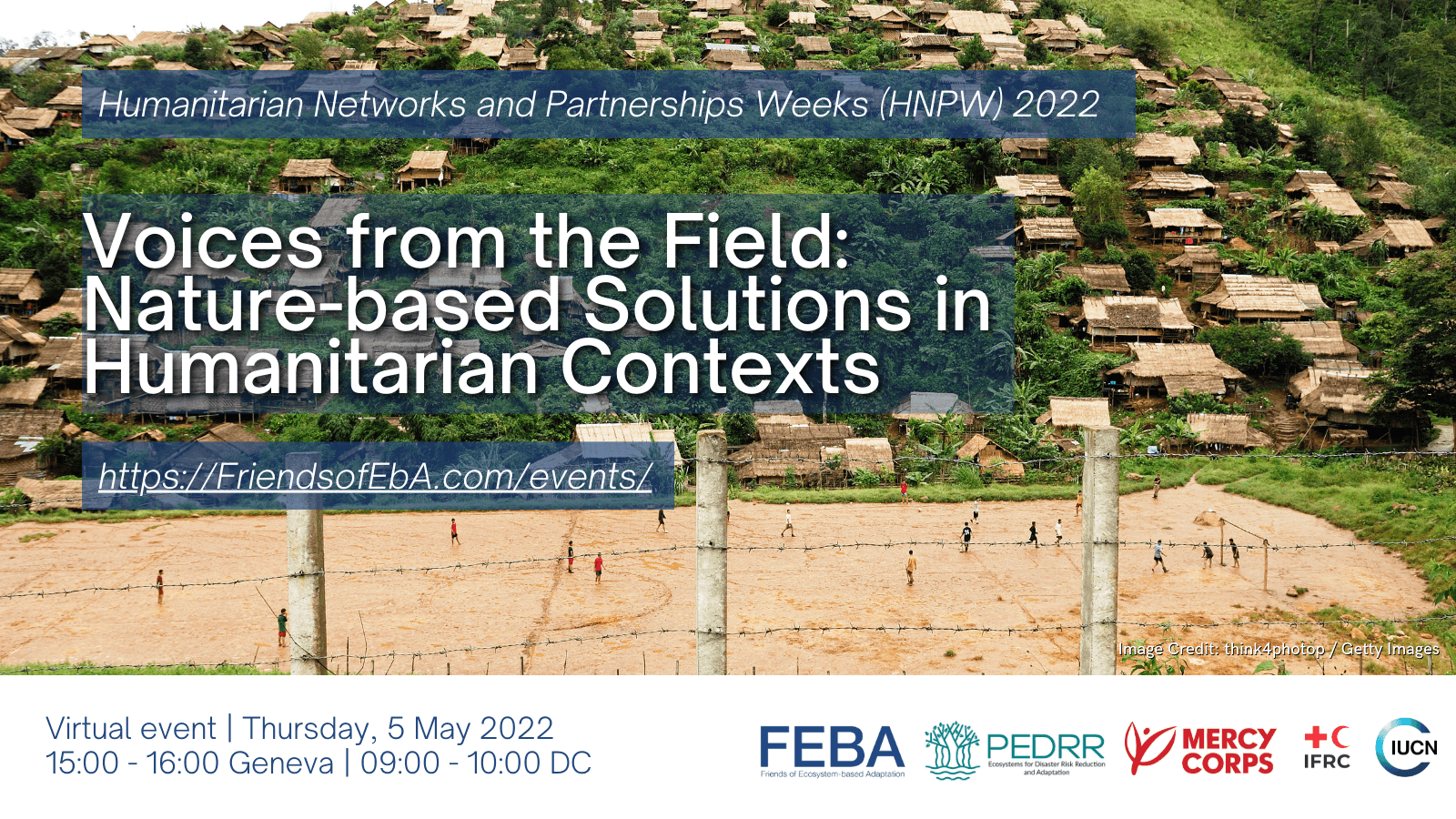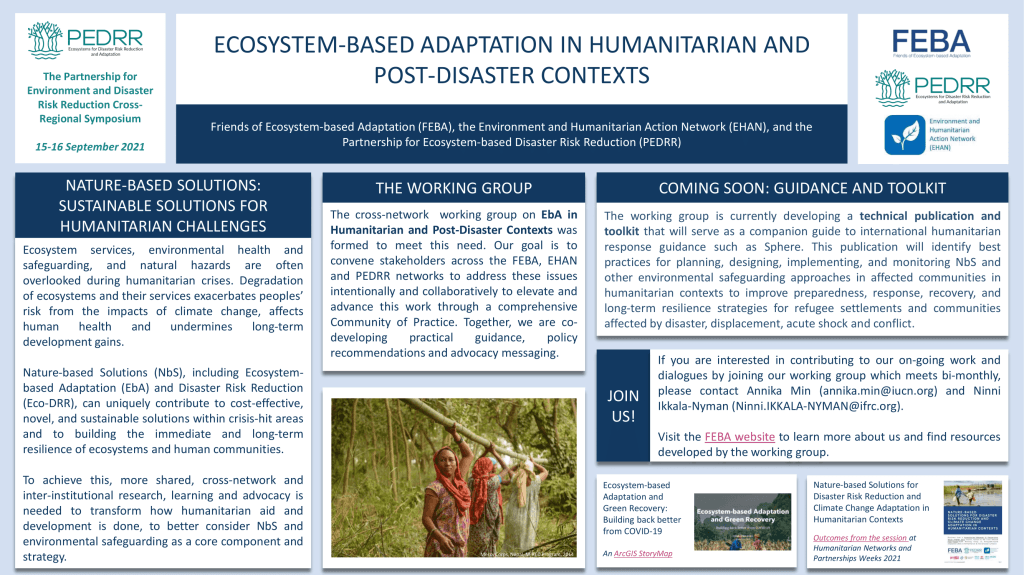NbS in Humanitarian Contexts
Chaired By

Ecosystem services, environmental health and safeguarding, and environmental hazards are often overlooked and degraded during humanitarian crises (e.g. protracted crises, conflict-affected fragile contexts, post-disaster, transitional recovery and development, etc.). Degradation of ecosystems and their services exacerbates peoples’ exposure to natural hazards and impacts from climate change, reducing access to safe, sufficient natural resources needed for livelihoods and undermining long-term development and increases. In addition, environmental and climactic factors play a critical role in the development and trajectory of complex crises. However, EbA can uniquely contribute to developing cost-effective, novel and durable solutions within crisis-hit areas, and contribute to building immediate and long-term resilience.
More shared, cross-network and inter-institutional research, learning and advocacy is needed to transform how humanitarian aid and development is done, to better consider nature based solutions and environmental safeguarding as a core component and strategy. The goal of this cross-network working group is to convene stakeholders across FEBA, the Environment and Humanitarian Action Network (EHAN) and the Partnership for Disaster Risk Reduction (PEDRR) networks to address these issues intentionally and collaboratively, elevating and advancing this work through a comprehensive Community of Practice.
Launched: Sphere Unpacked Guide on NbS
In April 2023 at the Humanitarian Networks & Partnerships Weeks (HNPW) 2023, the working group launched their flagship publication: “Nature-based Solutions for Climate Resilience in Humanitarian Contexts – A Sphere Unpacked Guide”.
Sphere Standards are the most widely recognized and utilized humanitarian standards across the globe. They are used to improve the quality and accountability of the humanitarian sector, used as reference tools by humanitarian agencies, advocacy groups, governments, and donors. The Sphere Handbook has been field-tested over twenty years and is regularly updated to ensure it remains fit for purpose in a changing world.
This Unpacked Guide focuses on NbS for resilience in humanitarian contexts, including for disaster risk reduction and climate change adaptation. Developed in partnership with Sphere, the guide was informed by the contributions of two Sphere focal point stakeholder roundtables and by the contributions of Working Group members and a broad range of experts. It: (1) Outlines how NbS can provide sustainable solutions to humanitarian challenges; (2) Identifies relevance to Sphere’s technical chapters: water, sanitation and hygiene; food security and nutrition; shelter; and health; (3) Identifies best practices for planning, designing, implementing, and monitoring NbS approaches in affected communities as part of preparedness, response, and early recovery resilience strategies; and (4) offers practical tools and resources for applying NbS in humanitarian contexts.
Knowledge Products
Scaling Up Nature-based Solutions in Humanitarian Contexts Session – 2024 Humanitarian Networks and Partnerships Week in Geneva

We are pleased to share with you the summary reports and presentations from our Workshop and Panel Discussion. If you missed the event, you can also watch the recording on Sphere’s YouTube channel here.
And don’t forget you can also download the Sphere Unpacked Guide to Nature-based Solutions for Climate Resilience in Humanitarian Action. We believe these resources will provide valuable insights and help you further explore the topics discussed during the event.
We also take this opportunity to highlight the reconvening of the FEBA working group on “Nature-based Solutions in the Humanitarian Contexts” on 27th June 2024. For more information about the Working Group please see visit its dedicated webpage.
Ecosystem-based Adaptation and Green Recovery: Building Back Better from COVID-19

In this new Friends of EbA (FEBA) multimedia story, entitled Ecosystem-based Adaptation and Green Recovery: Building back better from COVID-19, experiences are documented from communities around the world who are bearing the brunt of the impact of the pandemic, thus, showcasing the potential of EbA for building resilience to complex crises: including COVID-19. These lived, front-line experiences demonstrate the ability of EbA to both provide green work and economic recovery to communities in the short term, as well as reduce the vulnerabilities of ecosystems and communities for their health, livelihoods and well-being in the long term.
The multimedia story Ecosystem-based Adaptation and Green Recovery: Building back better from COVID-19 is available here and a news story with key messages is available here.
Nature-based Solutions for Disaster Risk Reduction and Climate Change Adaptation in Humanitarian Contexts
The working group hosted a session on Nature-based Solutions for Disaster Risk Reduction and Climate Change Adaptation in Humanitarian Contexts at Humanitarian Networks and Partnerships Weeks in May 2021.
In this session, a panel discussion of participants across sectors in nature-based solutions for disaster risk reduction explored the contribution of ecosystem-based adaptation (EbA) to developing cost-effective, novel and durable solutions within crisis-hit areas and building immediate and long-term resilience. Interactive small group discussions followed, exploring different themes and deliverables (e.g. policy briefs, a toolkit and guidance) of the working group’s learning agenda and promoting collective problem-solving and partnership.
Nature-based Solutions in Humanitarian Contexts: Key Messages
Key messages have been developed by the cross-network FEBA-PEDRR-EHAN working group on Nature-based Solutions in Humanitarian Contexts and released during UNFCCC COP26. These technical key messages emphasise the relevance of Nature-based Solutions (NbS) for the humanitarian sector, particularly in the context of strengthening climate and disaster resilience.
View the key messages document, which includes key asks for stakeholders and interested parties.
Events
Nature-based Solutions in Humanitarian Contexts: Objectives and Guidance for Transformative Integration
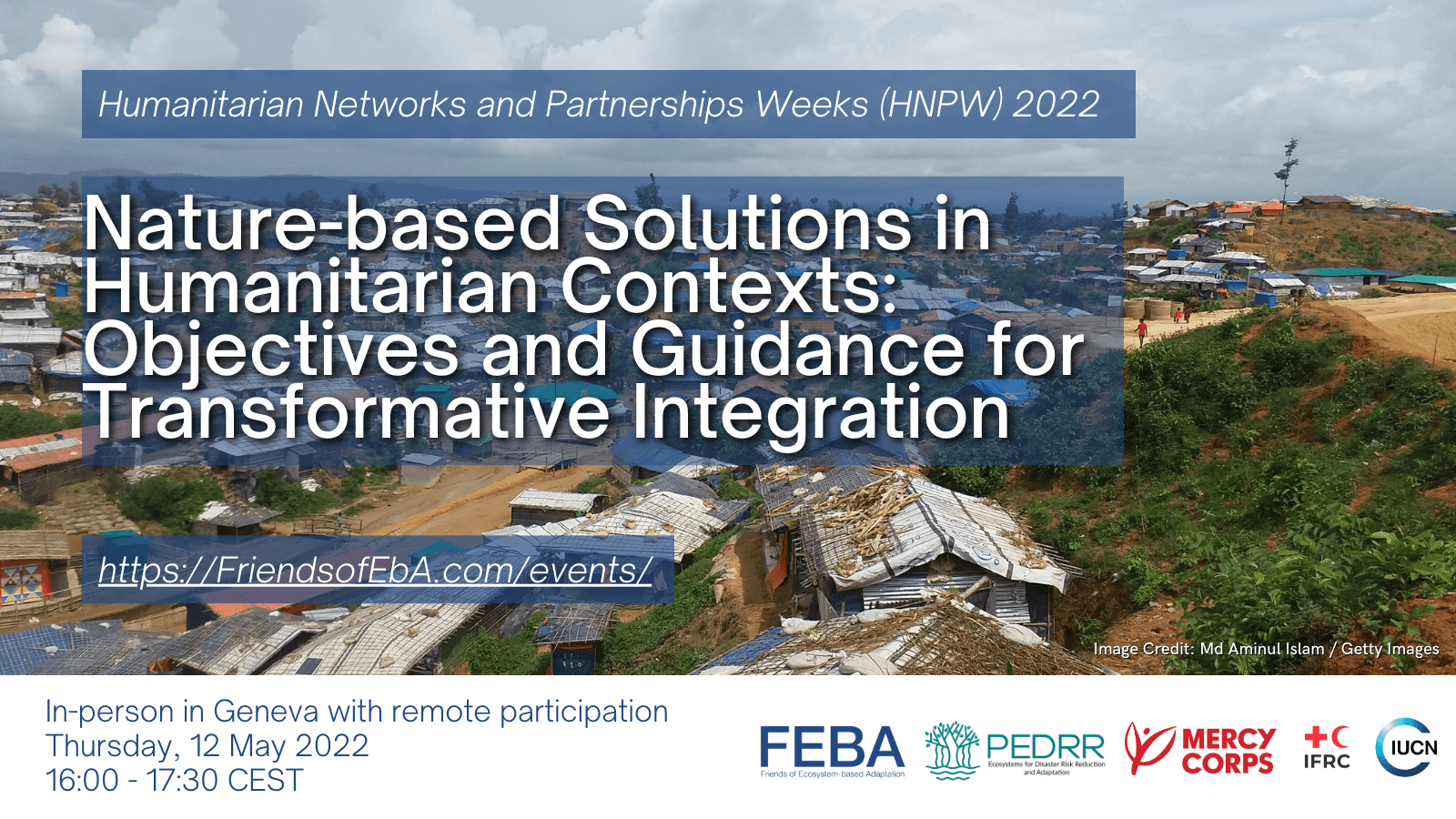
The FEBA-PEDRR-EHAN cross-network working group on NbS in Humanitarian Contexts hosted a side-event as part of 2022 Humanitarian Networks and Partnerships Week, centred on the working group’s efforts to transform humanitarian action through the integration of nature-based solutions and environmental considerations as a key component and strategy for achieving humanitarian objectives.
Learn more about the session here.
The FEBA-PEDRR-EHAN cross-network working group on NbS in Humanitarian Contexts hosted a virtual side-event as part of Humanitarian Networks and Partnerships Week, focused on the implementation of nature-based solutions in humanitarian contexts will share experiences and lessons learned from the field.
Learn more about the session here.
GP2022 Innovation Platform: Nature-based Solutions in Humanitarian Contexts
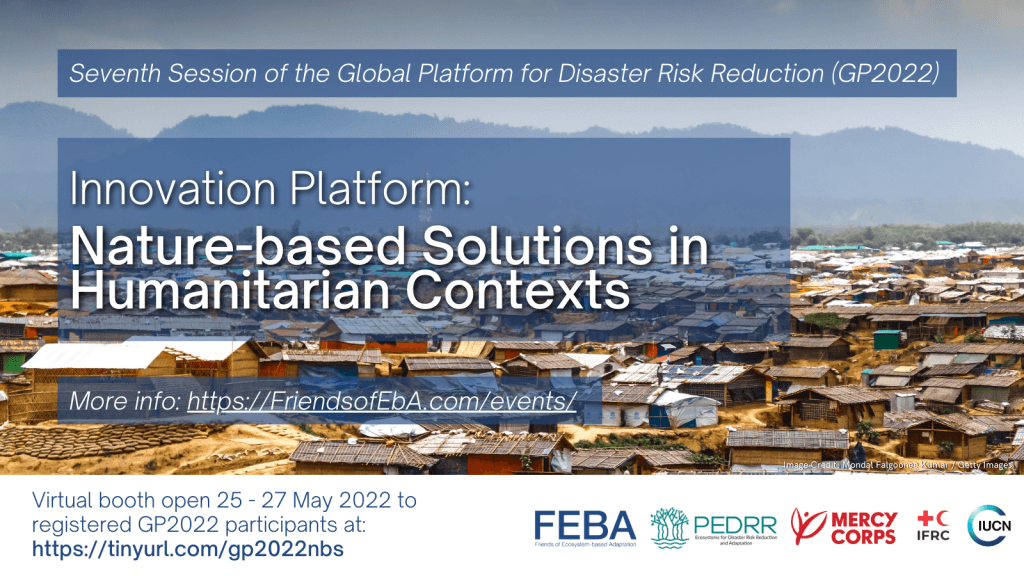
The FEBA-PEDRR-EHAN Working Group on NbS in Humanitarian Contexts will host a virtual Innovation Platform booth during the Global Platform for Disaster Risk Reduction (GP2022). The booth will share the latest inter-institutional best practices, research, learning, advocacy and resources in the emerging area of work on nature-based solutions in humanitarian contexts.
The Innovation Platform will be accessible from 25-27 May 2022 to registered GP2022 participants at the following link: https://tinyurl.com/gp2022nbs
Winning Poster at the PEDRR Cross-Regional Symposium
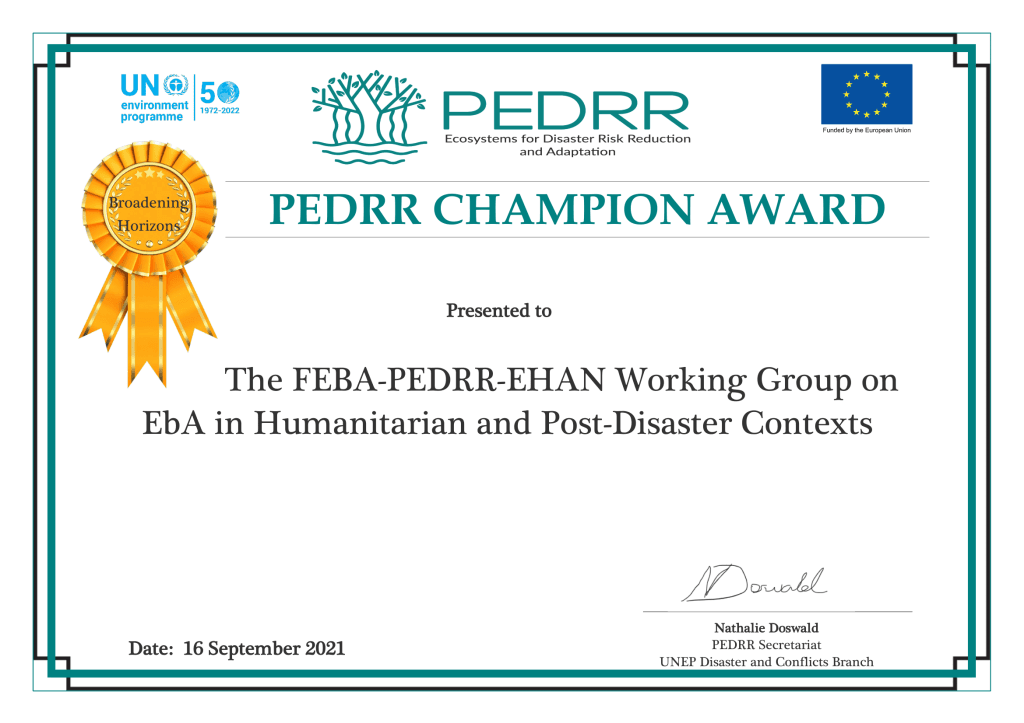
The cross-network FEBA-PEDRR-EHAN Working Group recently presented a poster to the Partnership for Environment and Disaster Risk Reduction (PEDRR) Cross-Regional Symposium, held from 15-16 September 2021. The poster set the scene for the urgency behind this working group, discussed previous products, and showcased the guidance and toolkit currently being produced.
The poster was awarded the PEDRR Champion Award in the category of Broadening Horizons.
If you are interested in joining this or another expert working group, or starting a working group on another topic, please contact us.





